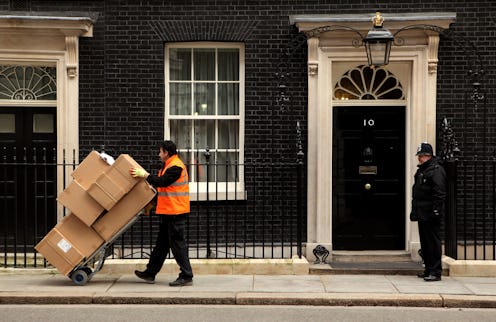News
Same-Day Delivery Is About to Be A Thing
We've all been there: you're craving some ice cream, are out of toilet paper, and could really use a lavender scented eye-pillow, stat. But it's raining. In an age of instant gratification and spoiled Americans, how is it that there still isn't a service that promises you anything you want, at your doorstep, almost immediately? In 1998, an instant-delivery service named Kozmo promised to be just that.
Like Dominoes without the pizza, the venture-capital company promised to bring you anything you wanted to buy — a lightbulb, a tin of cat food, a tub of toothpaste — immediately, courtesy of a delivery guy. Kozmo was a hit, but when the dot-com bubble burst in 2000, it died a staggeringly quick and painful death, losing millions along the way. Now it's back — but, these days, it's got a lot of competition.
Its main competitor is Google — no surprise there. Google's partnered with a bunch of retail stores, warehouses, and department stores for its "Google Shopping Express" service, which provides same-day delivery of anything and everything you order. Google Shopping Express is only in the pilot stage in parts of California at present, but has massive expansion plans in the works... because, you know, Google doesn't really do low-key. It's free for its lucky pilot customers, but there are whispers that it'll charge about $60 for annual membership, much like Amazon Prime. Right now, Shopping Express is set to deliver everything but food, so the company is also considering a food-delivery program akin to its rival's Amazon Fresh service — which, in turn, is only available in parts of Seattle and Los Angeles.
Sensing a theme? Yup: these big companies are tentative about dipping their toes in the buy-and-deliver-immediately industry, which, if done right, could tap into the billions that superstores like Walmart make each year. Their trepidation feels weird, because the same-day delivery of anything has obvious appeal, and there's a gap in the market just waiting for it: how often have you wished that someone could just grab you something, and deliver it to your door?
Amazon and Google have learned from failure like Kozmo, which is routinely used as one of the best examples of a victim of the dot-com bust. In short, Kozmo didn't anticipate how prohibitively expensive it is to deliver small packages. Even at the peak of Kozmo's success, analysts were pointing out that its business model just wasn't sustainable.
So, a decade on, what's changed? Well, the Internet has: both investors and consumers have gotten wise to what the Web is and isn't capable of, meaning Kozmo stands a better chance of being prepared this time. And Web users today are used to, and trust, micro-payments, which were viewed with suspicion at the turn of the millennium. We're already used to paying for small items on the Internet and waiting impatiently for them to come, thus widening the gap for a company that could do the same, only more quickly and cheaply. Which is exactly the arena that Google, Amazon, Kozmo, and a host of others — Instacart; Walmart, eBay – are trying to break into.
Here's the problem: For a service like Kozmo to be profitable, it either has to go hyper-local, and partner with a bunch of local stores in the area, or already be a national corporation with cash to spare; capable of the partnering with retail, grocery, and superstore giants. Amazon, Google, and Walmart are in the process of figuring out if they can do both. Kozmo sounds like it makes sense, but having runners pick up a tub of deep conditioner in a snowstorm and bike to someone's house with it just isn't a venture that is likely make much profit. Unfortunately for us.
Matthew Yglesias at Slate points out that it's not only has the Web landscape changed — the economy has, too. Kozmo launched in the middle of a labor boom, after all:
The current environment is the opposite. Lots of able-bodied people can't find work. Lots of young people aren't entering the labor force at all," he continued. "Wages haven't risen in forever. This is terrible news for America, but great news for a company looking to hire a bunch of guys to run around town delivering stuff.
Kozmo's been tight-lipped about the details of its comeback. In a statement to Bustle, its owner, Yummy.com, said: "While we can’t comment on any pending deals or the timing of launch plans, we think that the current retail landscape is ripe for disruption and we are excited to reintroduce a popular brand – this time with a proven, solid business model – in the near future."
As much as Amazon, eBay, and Walmart are desperately trying to speed up their deliveries, none of them have actually done much about it yet. If Kozmo launches swiftly, and has a smarter business plan than last time, it could be the only real player currently in the Bring it to me now! game.
